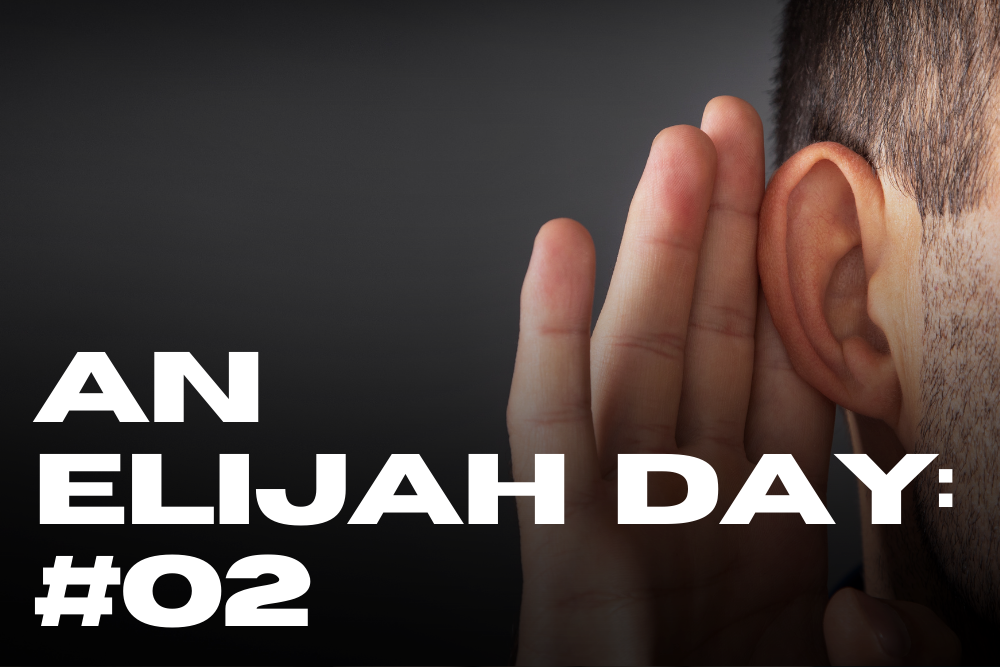The four closing points from last week’s post, all of which are necessary in an Elijah day, were:
• A passion for prayer
• A passion of the Lord
• A hatred for national sin
• A realization that is not person versus person, but the Everlasting God versus the prince of this world.
Over the next several weeks, I will expand on each to enunciate its necessity and develop its practice.
A Passion for Prayer
Prayer is the main street of all the avenues in hungering and thirsting after righteousness (cf. Matthew 5:6). Augustine said, “Whether we realize it or not, prayer is the encounter of God’s thirst with ours. God thirsts that we may thirst for him.”[1] In his quote, I see Jesus,
“…[on] that great day of the feast, Jesus stood and cried, saying, If any man thirst, let him come unto me, and drink” (John 7:37 KJV).
Naturally speaking, we need a base amount of water to survive; in exerted times, we thirst for more.
So, how much fluid does the average, healthy adult living in a temperate climate need? The U.S. National Academies of Sciences, Engineering, and Medicine determined that an adequate daily fluid intake is:
• About 15.5 cups (3.7 liters) of fluids a day for men
• About 11.5 cups (2.7 liters) of fluids a day for women[2]
(I shared those stats as a personal encouragement because I am notorious for not drinking enough water!)
An excellent place to begin thirsting after the Lord is to establish an adequate daily intake—10 minutes, 15, 30, 60 each day. You know your time and attention span, but start small. Most of us may have an idea but begin practically knowing that some time is better than none. Too much too quickly leads to disappointment, discouragement, and discontinuance. Just be yourself in selecting your time; it’s not a competition!
This daily intake works best in combination with regular time. In that time, I have found it best always to leave room for an overage. By that, I mean if I had a 30-minute time block, I wouldn’t set my prayer time at 30 minutes because I would always check the clock. Instead, I would set my prayer time for 15 minutes in that 30-minute window. I found a lot of freedom in practice.
Additionally, I would try to hit that time whether I felt like it or not (another reason not to fill your entire window with prayer time only). Nearly always, sitting there for a short time would launch me into prayer. Why? Because in my secret place of prayer, the Father is always there (cf. Matthew 6:6),[3] and He thirsts for me so much that He will give me a desire to thirst for Him.
This is the best place to begin: Asking the Father for the desire to thirst. Stephen Neilson’s 5 Ways to Deepen Your Desire in Prayer is a good read for those wishing further explanation.
A Passion of the Lord
As you may recall from the last post, a passion of the Lord was the prerequisite of Elijah’s confrontation with Ahab.
Thus, I believe that Elijah’s passion for the Lord was such that in his time of prayer (remember v. 1, …before whom [the Lord] I stand), the Lord spoke to him; the disgust and disappointment of Israel’s sin felt by the Lord became the burden of Elijah, and he became His voice.
How so? Mother Teresa shared,
“God speaks in the silence of the heart. Listening is the beginning of prayer.”[4]
Way too many times, prayer becomes a monologue where the petitioner is the sole speaker. Being able to listen is vital in prayer and, thus, attaining the passion of the Lord.
Jesus instructed, albeit vaguely, us regarding listening in prayer when he said,
“Thy kingdom come. Thy will be done in earth, as it is in heaven” (Matthew 6:10 KJV).
Listening, whether in prayer or by reading the Word, is critical to knowing the will of God.
Follow me in this cycle of prayer to fulfill Matthew 6:10:
1. God’s will begins in heaven;
2. Through a listening prayer, it is revealed to the one praying;3. Then, it is sent back to heaven with a spoken prayer;
4. Once returned, God moves His will on earth.
I believe this can be seen in James 5:17 and was the precursor to Elijah standing before Ahab in 1 Kings 17:1,
“Elijah was a man with a nature like ours, and he prayed earnestly that it would not rain, and it did not rain on the earth for three years and six months” (James 5:17 NASB);
“Now Elijah the Tishbite, who was of the settlers of Gilead, said to Ahab, ‘As the LORD, the God of Israel lives, before whom I stand, surely there shall be neither dew nor rain these years, except by my word’” (1 Kings 17:1 NASB).
Elijah didn’t pull that number of his own accord; it was given to him in prayer and illustrated in James 5:16, “The effectual fervent prayer of a righteous man availeth much.” The passion—fervent—prayer availed because God’s passion fueled it!
All because Elijah listened in prayer.



